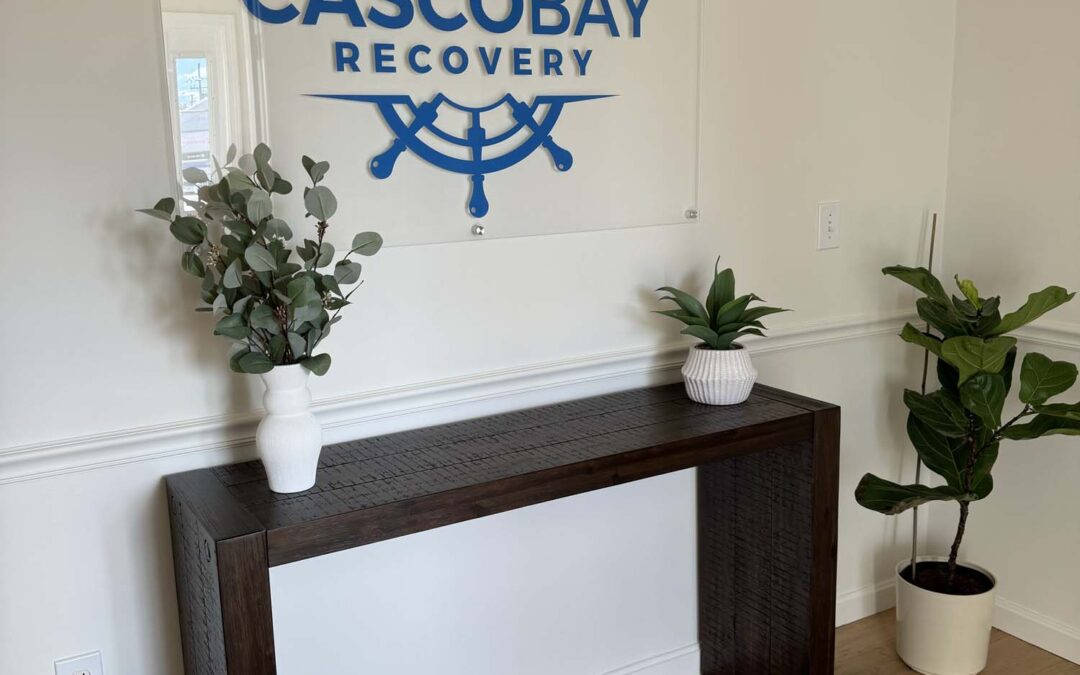Transitioning out of addiction treatment is a significant milestone. You’ve accomplished incredible things by confronting your addiction and taking steps towards a healthier life. However, the journey to recovery doesn’t end when you leave rehab. In fact, aftercare after rehab is a crucial component of long-term sobriety.
This article will explore the importance of aftercare after rehab, outlining the benefits it offers and the different types of programs available. We’ll also discuss how Casco Bay Recovery can support you in building a strong aftercare plan that sets you up for lasting success.
Why is Aftercare After Rehab Important?
Addiction is a chronic disease. Just like other chronic conditions, such as diabetes or heart disease, managing addiction requires ongoing care and support. Aftercare after rehab provides a structured environment to continue the progress made in treatment while navigating the challenges of reintegrating into daily life.
Here are some key reasons why aftercare after rehab is essential:
- Relapse Prevention: According to the National Institute on Drug Abuse (NIDA), relapse rates for substance use disorders are high. Aftercare programs equip you with the tools and strategies to identify triggers, manage cravings, and cope with stress in healthy ways, significantly reducing your risk of relapse.
- Continued Support: Leaving the structured environment of rehab can be daunting. Aftercare programs provide a supportive network of peers and professionals who understand your struggles and can offer guidance and encouragement as you navigate your recovery journey.
- Developing Life Skills: Addiction often disrupts various aspects of life. Aftercare programs can help you develop essential life skills, such as healthy communication, budgeting, and relapse prevention planning, which are crucial for building a fulfilling and sustainable life in recovery.
- Addressing Underlying Issues: Addiction often co-occurs with mental health disorders. Aftercare programs can provide ongoing therapy to address any underlying mental health conditions that may contribute to your addiction, promoting overall well-being.
- Building a Recovery Community: Aftercare programs connect you with others who are on similar paths,fostering a sense of belonging and reducing feelings of isolation, which are significant risk factors for relapse.
Benefits of Aftercare After Rehab
The benefits of aftercare after rehab are numerous and far-reaching. Here are some of the key advantages:
- Increased Chances of Long-Term Sobriety: Studies consistently show that individuals who participate in aftercare programs have a significantly higher chance of achieving long-term sobriety.
- Improved Mental and Physical Health: Aftercare programs can help you address any underlying mental health conditions and promote healthy lifestyle choices, leading to overall improved well-being.
- Stronger Relationships: Addiction can strain relationships. However, aftercare programs can help you rebuild trust and develop healthier communication skills, ultimately leading to stronger relationships with loved ones.
- Increased Employment Opportunities: Maintaining sobriety can improve your employability. Aftercare programs can provide job search assistance and other resources to help you re-enter the workforce.
- Greater Sense of Purpose: As you progress in your recovery journey, you’ll develop a renewed sense of purpose and direction in life. Aftercare programs can help you identify your goals and create a plan to achieve them.
Different Types of Aftercare Programs
There are various types of aftercare programs available, each catering to specific needs and preferences. Here’s an overview of some common options:
- Outpatient Programs: These programs offer therapy sessions, support groups, and other services on a regular basis while allowing you to live independently. Casco Bay Recovery offers intensive outpatient programs (IOPs) and traditional outpatient programs (OPs) to provide the level of support you need. (link to Outpatient Programs at Casco Bay Recovery)
- Sober Living Homes: These structured living environments provide a safe and supportive space to live while transitioning back into society. Residents typically participate in therapy, attend support groups, and follow house rules that promote recovery.
- Support Groups: Connecting with others who understand your struggles can be incredibly valuable. For instance, support groups like 12-step programs (Alcoholics Anonymous, Narcotics Anonymous, etc.) offer a safe space to share experiences, gain encouragement, and learn from others in recovery.
- Individual Therapy: Ongoing therapy sessions with a qualified therapist can help you address underlying issues, develop coping mechanisms, and work through any challenges you encounter in your recovery journey.
- Family Therapy: Addiction can have a profound impact on families. Therefore, family therapy provides a safe space for open communication, healing, and rebuilding relationships. By addressing the impact of addiction on family dynamics, it consequently helps to create a supportive environment that fosters long-term recovery.
The Role of Aftercare in Building a Strong Foundation
Aftercare after rehab is not just about the individual in recovery; it’s about rebuilding lives and strengthening relationships. A strong support system is essential for maintaining sobriety. Moreover, Casco Bay Recovery understands the importance of family involvement in the recovery process and offers comprehensive aftercare programs that include family therapy and education.
Creating a Personalized Aftercare Plan
Every individual’s recovery journey is unique. Therefore, it’s crucial to develop a personalized aftercare plan that addresses your specific needs and goals. Casco Bay Recovery works closely with you to create a tailored aftercare plan that includes a combination of therapies, support groups, and other resources.
Building a Strong Support Network
A strong support network is a cornerstone of long-term recovery. Aftercare programs help you build and maintain healthy relationships with family, friends, and peers in recovery. By surrounding yourself with supportive people, you’ll have a safety net to rely on during challenging times.
Overcoming Challenges and Celebrating Successes
Recovery is a journey filled with both challenges and triumphs. Aftercare programs provide ongoing support to help you navigate obstacles and celebrate your successes. By building resilience and developing coping mechanisms, you’ll be better equipped to handle life’s ups and downs without resorting to substance use.
Overcoming Relapse: Building Resilience Through Aftercare
Relapse is a common experience in addiction recovery. However, it doesn’t define your journey. Aftercare programs equip you with the tools and strategies to prevent relapse and develop resilience. For instance, by understanding the warning signs of relapse and learning healthy coping mechanisms, you can navigate challenges without resorting to substance use.
Common Relapse Triggers
- Stress: Life can be overwhelming, and stress can be a significant trigger for relapse. Aftercare programs teach you effective stress management techniques, such as mindfulness, meditation, and exercise.
- Social Pressures: Peer pressure and social situations can be challenging for those in recovery. Aftercare provides support in developing assertiveness skills and building a strong support network.
- Loneliness and Isolation: Feeling disconnected can lead to relapse. Aftercare programs promote social interaction and connection through support groups and community involvement.
- Physical and Emotional Pain: Unmanaged physical or emotional pain can be a trigger. Aftercare helps you develop healthy ways to cope with pain and seek appropriate medical attention.
Developing a Relapse Prevention Plan
A relapse prevention plan is a personalized roadmap for staying sober. Specifically, it involves identifying potential triggers, developing coping strategies, and creating a support system. Additionally, aftercare programs can help you create a comprehensive relapse prevention plan and provide ongoing support to implement it.
The Role of Support Groups in Recovery
Support groups are invaluable resources for individuals in recovery. For instance, they offer a safe and supportive environment to share experiences, receive encouragement, and learn from others who understand the challenges of addiction.
- Building a Support Network: Support groups connect you with people who are going through similar experiences, fostering a sense of belonging and camaraderie.
- Learning from Others: Sharing stories and experiences can provide valuable insights and coping strategies.
- Developing Accountability: Support groups offer a sense of accountability, encouraging you to stay committed to your recovery goals.
- Reducing Feelings of Isolation: Connecting with others in recovery can help alleviate feelings of loneliness and isolation.
Popular Support Groups
- Alcoholics Anonymous (AA)
- Narcotics Anonymous (NA)
- Cocaine Anonymous (CA)
- Al-Anon (for family and friends of alcoholics)
- Nar-Anon (for family and friends of addicts)
The Benefits of Continued Therapy
Therapy is a cornerstone of aftercare after rehab. It provides a safe space to explore underlying issues, develop coping mechanisms, and work towards personal growth.
- Addressing Underlying Issues: Therapy can help identify and address the root causes of addiction, such as trauma, depression, or anxiety.
- Developing Coping Skills: Learning healthy coping mechanisms is essential for managing stress and triggers.
- Improving Relationships: Therapy can help you repair damaged relationships and build stronger connections with loved ones.
- Enhancing Self-Esteem: Building self-confidence and self-worth is crucial for long-term recovery.
The Importance of Holistic Wellness
Holistic wellness encompasses physical, mental, emotional, and spiritual well-being. Aftercare programs often incorporate holistic approaches to promote overall health and recovery.
- Physical Health: Regular exercise, proper nutrition, and sufficient sleep are essential for maintaining physical health and preventing relapse.
- Mental Health: Mindfulness practices, meditation, and yoga can help manage stress and improve mental well-being.
- Emotional Health: Emotional regulation and self-care are vital for emotional resilience.
- Spiritual Well-Being: Connecting with a higher power or finding meaning in life can provide a sense of purpose and direction.
Maintaining Sobriety: A Lifelong Journey
Recovery is a lifelong journey, and aftercare after rehab is an ongoing process. By prioritizing your well-being, building a strong support network, and continuing to learn and grow, you can achieve lasting sobriety and build a fulfilling life in recovery.
Aftercare after rehab is a critical step in the recovery process. In fact, it provides the ongoing support, structure, and tools needed to maintain sobriety and build a fulfilling life. By investing in aftercare, you’re investing in your future. Consequently, Casco Bay Recovery is committed to supporting you on your recovery journey. Contact us today to learn more about our aftercare programs and how we can help you achieve long-term success.








